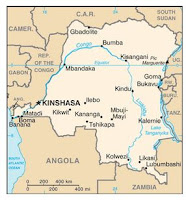#13,315
Overnight the World Health Organization published the following update on the recent Ebola outbreak in the Democratic Republic of the Congo (DRC) (see Ebola In The DRC. . . ).
As the following CDC graphic explains, evidence suggest that bats are the reservoir host for the Ebola (and Marburg) viruses, which can occasionally spill over to other mammals - including humans - which can amplify their spread.
While always carrying a fearsome mortality rate, until the 2014-15 West African epidemic, outbreaks were relatively small and occurred mostly in very remote, sparsely populated regions, limiting their impact.
The experience in Guinea, Liberia, and Sierra Leone have shown that Ebola has the capability of sparking large, regional epidemics.Ebola virus disease and the (closely related) Marburg virus are on the WHO's short list of pathogens (see WHO List Of Blueprint Priority Diseases) viewed as having the potential to spark major public health emergencies.
Ebola virus disease – Democratic Republic of the Congo
Disease outbreak news
14 May 2018
Since the publication of the first Disease Outbreak News on the Ebola outbreak in Equateur province, Democratic Republic of the Congo on 10 May 2018, an additional seven suspected cases have been notified by the country’s Ministry of Health. Importantly, since the last update, cases have been reviewed and reclassified, and some discarded.
From 4 April through 13 May 2018, a total of 39 Ebola virus disease cases have been reported, including 19 deaths (case fatality rate = 49%) and three health care workers. Cases were reported from the Bikoro health zone (n=29; two confirmed, 20 probable and 7 suspected cases), Iboko health zone (n=8; three probable and five suspected cases) and Wangata health zone (n=2; two probable cases).
To date, 393 contacts have been identified and are being followed-up.
Wangata health zone is adjacent to the provincial port city of Mbandaka (population 1.2 million). Response teams on the ground are in the process of verifying information on reported cases. Case numbers will be revised as further information becomes available.
Public health response
The Ministry of Health in the Democratic Republic of the Congo is coordinating the response.
WHO is working with the Ministry of Health and MSF to conduct ring vaccination using the investigational recombinant vesicular stomatitis virus–Zaire Ebola virus (rVSV-ZEBOV).
In Bikoro, Iboko, and Mbandaka health zones, the Ministry of Health along with WHO and partners are engaged in strengthening surveillance for new cases, carrying out contact tracing, case management, and community engagement, ensuring safe and dignified burials, and coordinating the response.
WHO is deploying 50 public health experts to support the Ministry of Health with response activities.
An air bridge for supplies and personnel will be established by the United Nations Humanitarian Air Service (UNHAS) starting 13 May with daily flights scheduled from Kinshasa to Mbandaka and Mbandaka to Bikoro.
WHO has released $1 million US dollars from the contingency fund for emergencies, the United Nations has released $2 million US dollars from the Central Emergency Response Funds, and the Welcome Trust has provided 2 million pounds sterling for critical research needs.
The WHO Director General, Deputy Director General for Emergency Preparedness and Response together with the WHO Regional Director for Africa will be in Kinshasa on 13 May to review operations and discuss further support to the Ministry of Health.
WHO risk assessment
Information about the extent of the outbreak is still limited and investigations are ongoing. The cases are being reported from remote locations that are difficult to access. However, the proximity of the affected area to the Congo River, which links to the Republic of the Congo and the Central African Republic, increases the risk of cases occurring in neighboring countries. Currently, WHO considers the public health risk to be high at the national level, moderate at the regional level, and low at the international level. As further information becomes available, the risk assessment will be reviewed.
At present, this event does not meet the criteria of a public heath event of international concern as defined in the IHR (2005) 1, and does not warrant the convening of an Emergency Committee under the IHR (2005).
WHO advice
WHO advises against any restriction of travel and trade to Democratic Republic of the Congo based on the currently available information. WHO continues to monitor travel and trade measures in relation to this event, and currently there are no restrictions of the international traffic in place.
For more information on Ebola virus disease, please see the link below:
Ebola Virus Disease fact sheet
(Editor's Note: While I'm back to blogging after a two-day hiatus, I'll probably be limited to one or two early morning blogs per day for the next week or so).

